How to Start a Beard Business in 2020
Paul Lee’s first crack at ecommerce came with a product that he knew would make him millions. The idea was to create an elixir to kickstart facial hair growth for dudes with weak beards. He’d study hair growth, he’d learn the chemistry behind hair growth products, he’d get FDA approval, and bam – he’d be pulling hundreds out of the big, fat beard he grew with his magical product.
Yeah, that didn’t work. Paul ran into roadblock after roadblock, and was forced to pivot. He stayed in beards, but instead of selling this magical formula to grow a beard, he took all the knowledge he’d accumulated about the beard world and turned his fire toward beard care products.
His store took off, and before long Paul quit college and was doing ecommerce full time. Actually, it was more than full-time. He never took breaks, he was pulling 10-hour days, he got obsessed, and by the time he sold his beard store on Shopify Exchange for $80,000, he was thoroughly, thoroughly burnt out.
Paul joined Start Yours to talk about the crappy college teacher that inspired him to finally drop out, the branding strategy that fueled his success, his approach to product selection, his Facebook ads best practices and, first off, how someone who couldn’t grow a beard to save his life became a beard connoisseur.
Start Yours is a podcast about ecommerce, dropshipping, and all things launching a business.
Join us as we meet entrepreneurs who have gone through the triumphs and headaches of running an online store, and learn how they managed to survive and thrive.
In today’s podcast episode, we’ll learn how to start a beard business. Paul Lee will share his experience building Husky Beard so you’ll learn all the exact steps you’ll need to take if you decide to build a beard business yourself.



How to Start a Beard Business
Hitting A Roadblock In Business
David: So your first big business idea was to sell custom-made beard growth products for guys who wanted to grow their beards more quickly, and it didn’t take long before you’ve realized that this was a pretty complicated process. You had to start studying facial hair, you were contacting chemists about how to make these products, you were talking to specialists and all sorts of stuff, and eventually, you got kinda scared off from this idea. In some alternate universe, could that have been the end of your ecommerce journey right there? Like you had this great idea, it turns out it was next to impossible, and then that’s that?
Paul: So yeah, it really felt like that. I had spent about three months and all of my savings pursuing this beard growth project and I was just so determined to make this work, I just thought that this is my next million-dollar, like multi-million dollar product. And yeah, I had that call with the FDA auditor and then he basically told me straightforwardly, “This is not going to work. You’re going to regret this. You’re gonna get audited one day and basically, you’re gonna have your entire inventory destroyed,” and I just got extremely discouraged. So about two days, I just kinda didn’t do anything, just put my head down.
→ Click Here to Launch Your Online Business with Shopify
And then I thought about it, I was like, “I have so much understanding of this bearded community. I understand the products, I understand how hair works and the study of it, and just like the… Just everything about it, really.” And then I already knew that there were beard businesses making millions of dollars, and one in particular, I just studied him. I followed all of his interviews and stuff and I just, I was like, “I don’t have a beard, but I know how to make a good beard care product, I know I can buy it from Alibaba, AliExpress,” and that’s how I started.
I just started with a… Did a complete 180 pivot, not beard growth products, but beard care products to existing customers who already have beards. So I just made that 180 and yeah, that’s where we are.
Motivation to Start a Beard Business
David: And so, going from the beard growth to the beard products, it’s like you said, it’s a 180, but it’s clearly in the same niche. What was it about starting a beard business that was so attractive?
Paul: So I had a strange obsession with wanting to grow a beard. I just didn’t see any of my Asian friends or any Asians at all, Eastern Asians, they didn’t have any beards, and I was like, “Man, I really want to stand out. I really just want to see what it looks like.” So I first tried it for like about a month and had nothing but patches, and then I stumbled upon this product, it’s called Rogaine with Minoxidil, and I found out there’s this huge community online, on YouTube, Facebook, forums and stuff.
Guys essentially putting this on their faces and trying to grow a beard, and then I decided to do that and document it on YouTube. And then about a year later, I had like three million-plus views. So I really had this kind of fan base, and I just really felt very attached to the community. I knew exactly their pain points, their desires and I really had a relationship with them, so that really strengthened my confidence in pursuing this.
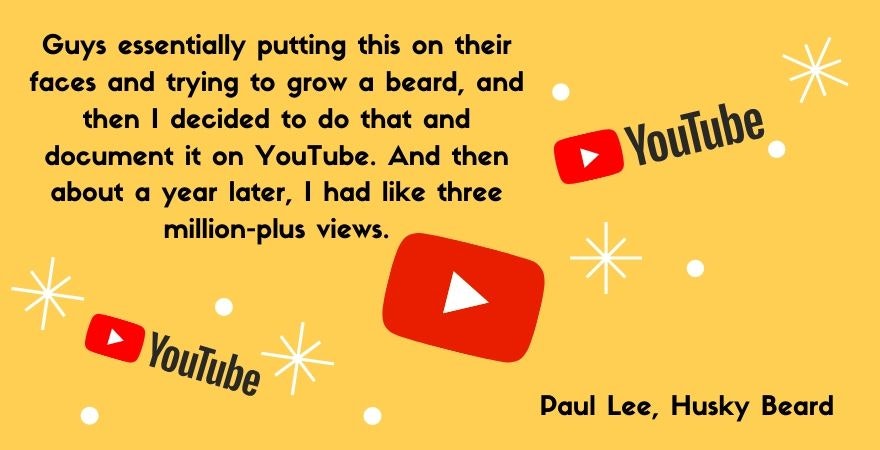
Promoting Your Business on YouTube
David: Cool. And then was, the views and the traffic that you got from that, was that all happening organically, or did you actively promote these videos? What was the marketing strategy behind the YouTube video?
Paul: So yeah, there was no game plan. I just essentially never started YouTube before, and I just kinda picked up the camera, set it up in my restroom, recorded a little two-minute video. All of a sudden, I had like 10,000 views in like two days or three days, and it was just a little overwhelming, so I just really decided to stick with it. Everybody was commenting, “Next week, post the update. Next week, post the update.” So like I had to… They kept me accountable. If you guys wanna see it, it’s LegitPauls on YouTube, and yeah, you guys could check it out. It’s really strange, there was about like two years of non-stop trying to grow the beard.
David: And you don’t have a beard today. Sorry, did you give up on the dream or?
Paul: Yeah, I gave up, I gave up. A lot of people were disappointed, and then a lot of people were like, “Finally, you understand.” It was very mixed reactions.
Dealing with the FDA
David: So getting back to the… You talked about the Food and Drug Administration and, kind of, these hurdles that you had at the very beginning of your beard business. Was there any part of you that was excited by this process? I think a lot of ecommerce entrepreneurs, they have this competitive streak. And so you were talking about somebody tells you, “Hey, this isn’t gonna work, don’t do it. I’m advising you, no, no, no.” Was part of you thinking, “Screw this. I am gonna have a beard business”? Did it… Was there any inspiration that you got from this frustration?
Paul: Yeah. In the beginning, it’s just so much discouragement. It wasn’t just a lack of support, which I wanted. It wasn’t just that, it was direct discouragement, “Do not do this.” All of my friends, all my family. Sounds ridiculous. A guy without a beard trying to grow beard care brands for his living, and potentially drop out, which I did.
And yeah, that discouragement, just the amount of people who did not believe in me. My closest friends, family, really made me use that negative energy and want to prove them wrong and just cannot wait till that one day where I’m like, “I made it. I did exactly what you guys said I could not do.” So that negative energy was really motivational.
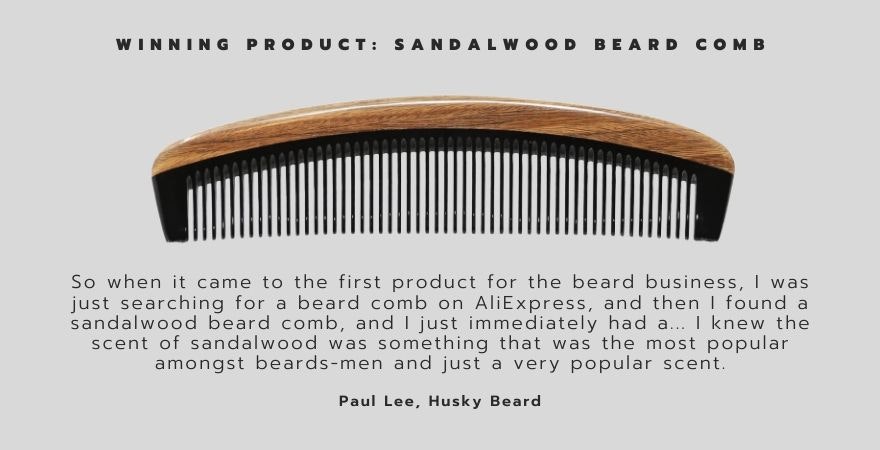
Making a Pivot in Business
David: So you pivoted away from the custom-made beard-growing idea and towards these general beard products. So this would be the oils and combs, and anything and everything beard. The knowledge that you gained from your initial studies, I assume that that was a big part of the products and the different things that you implemented in your store once you did launch?
Paul: Yeah. I basically translated all that knowledge of the extracts, the hair follicles, the cycles, the fact that men actually care about… Certain men, not every man, but certain men care a lot about their beards. It’s like a whole lifestyle. And I really catered my beard business towards that very passionate beards-man who has like very long beard, very well-kempt, they live that rugged lifestyle of masculinity, traditional masculinity, and that was my target audience sense, and then I came up with products that really appealed to them.
So when it came to the first product for the beard business, I was just searching for a beard comb on AliExpress, and then I found a sandalwood beard comb, and I just immediately had a… I knew the scent of sandalwood was something that was the most popular amongst beards-men and just a very popular scent. And my positioning was, “Groom in the morning and have a pleasureful experience as you smell the aroma of sandalwood every time you stroke the comb through your beard.” So that just really took off and…
David: Makes me wish I had a beard.
Paul: Yeah. Just the experience of when the wind goes by, you smell a little bit of it. And yeah, the passionate beards-men, they really loved that.
Understanding Your Target Audience
David: Cool. And so it’s interesting you talk about the mentality or this persona of dudes who have beards and dudes who like to take care of them. I guess this informed also, the name of your store was Husky Beard. And so, you know, Husky’s a very, very rugged animal running through snow.
Paul: Yeah, alpha…
David: They can… Endurance and all that stuff. So as somebody who does not have a beard, who couldn’t really grow a beard, it’s interesting that you were able to gain so many insights about this community, or about this group of people who you’d be selling to. How were you able to put yourself in their shoes like that?
Paul: I just put myself in their shoes by just studying the community. So I would do a lot of research for my beard business, like, “How do I speak like them, the lingo? How do they think? What are their lifestyles? What do they like, what do they do not like?” And I did all this research through Facebook groups, subreddits, and just some… A couple of other online communities. But basically, I just asked them questions, I just analyzed their posts and stuff, and I just looked at the patterns and really catered towards exactly what they wanted.
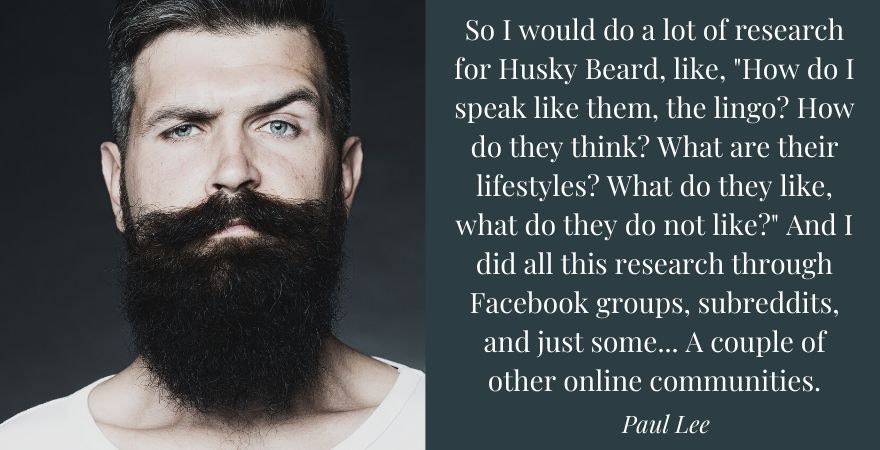
David: And so it’s not just a well-defined group. I mean, it is, they have their Reddit pages and their communities. And so it is a group of people that fits into a certain mold. But it’s also, like you said, a group of people that is really passionate about taking care of their beards, and that means that they’re passionate about spending money on things. Is the fact that it’s not just some sort of passive hobby, but in fact, a lifestyle that they’re willing to spend money on, was that a big deal to get things off the ground?
Paul: Yeah, it was a huge part of why Husky Beard business came to what it was because there were just so many passionate beards-men, they spend a lot of money on their beard care products. And I looked at my other competitors and they had much higher prices, or their branding was very specific towards like motorcyclists, just like the extremely narrowed down audience. So I wanted to be a little bit broader in the sense that this product appeals to any guy who has a beard and wants to look great.
Building a Beard Brand
David: So one thing that’s interesting about how you approached ecommerce is that from the very beginning, you were focused on not just having a store, but on brand strategy. So you envisioned Husky Beard as a brand from the very beginning and part of that meant that you collaborated with suppliers and manufacturers to get custom product packaging or custom designs on these products, ’cause as anybody who’s dropshipped from AliExpress knows, the products are…
They’re… A lot of them are really high quality, but they’re generic, they don’t have… It’s hard to get Husky Beard logo-ing and packaging on a product that’s just being shipped blindly from AliExpress.
In hindsight, what do you think about this approach for a beginner dropshipper? Was this… It added a lot of complexity I’m sure from the very beginning, but also gave you a leg up on somebody who didn’t have branded products. What can you say to somebody who’s thinking about to brand or not to brand and how this helped and maybe slowed down things getting out of the gate?
Paul: So I’d say the biggest differentiation between going the niche kinda branded approach, versus the general dropshipping just selling whatever, it’s really the longevity of it. So a general store and other similar stores, it doesn’t really hold much of a value, a valuable asset. You can’t really resell it that much, ’cause it’s just a store with a bunch of random products. You don’t really have any catered audiences, they’re not that valuable.
So I think the biggest differentiation and the question to ask yourself is, “How long do I wanna keep up with the store? Do I want this to be something I’m very passionate about, something that I’m proud of owning, something that I really want to build?”
And it’s like creating a mom-and-pop shop, or like that whole story of the American small business success story, versus, “Do I just wanna make as much money as fast as possible selling anything and everything that’s trending?” So those are the really the biggest differentiators. They’re both very valuable. They both just have different kinds of time scales and a different approach.
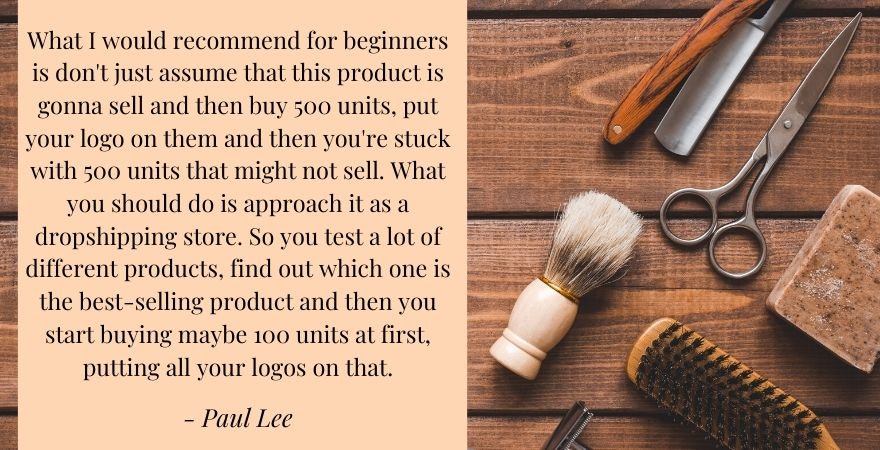
David: And so if somebody takes this first approach that you talked about, where they’re really committed to having a brand and not just like pump and dump dropshipping, what should they expect when it comes to the time that takes or to the money that takes? ‘Cause I think maybe, it sounds like from what you’re saying, the long-term upside is higher, but it seems like the flipside of that is that the immediate headaches might be greater or the immediate to-dos right away are gonna be a lot longer. So what should people be ready to deal with or be able to tackle when they go this branded route?
Paul: So I think when you’re first starting a very niche kinda branded beard business, you have to understand that the scope of products that you can test is very limited to only that niche, whereas opposed, if you’re a general dropshipping store, you could test any product from any category. So that’s gonna be the biggest limitation. It’s gonna be kind of harder to find winning products ’cause you’re so narrowed down. So in that regard, you have to be a little bit more patient, you’re not gonna get those instant sales, instant gratification, you’re really just depending on building a large customer base, really great high-quality products eventually.
What I would recommend for beginners is don’t just assume that this product is gonna sell and then buy 500 units, put your logo on them and then you’re stuck with 500 units that might not sell. What you should do is approach it as a dropshipping store. So you test a lot of different products, find out which one is the best-selling product and then you start buying maybe 100 units at first, putting all your logos on that. And then that sells out, then you buy 500 next time, and then you buy 1,000, and then you eventually private label the other products. Eventually, it’s an entirely private-labeled branded beard business.
David: So it sounds like what you’re saying is that you would’ve done a sort of product research with unbranded products just to see what sells. Once you think you have your finger on the pulse of what’s gonna sell, then you can invest in the ecommerce branding side of it?
Paul: I didn’t really do too much research, to be honest. I guess the little bit of research I did was look at competitors and just see the product catalogs there. But really what I did was I just went on AliExpress, just searched up my niche, so beard, and I just scrolled through like 50 pages and imported any product that caught my eye, and then eventually just came up with some marketing creatives and stuff. And yeah, that’s how I just tested a bunch of products.
David: And from these products that sold, that’s how you knew where to devote your energy when it came to the branding stuff?
Paul: Yeah. So I only private-labeled only the best-selling beard products ’cause there’s just too much risk purchasing everything and… Yeah, so it was a very low-risk approach.
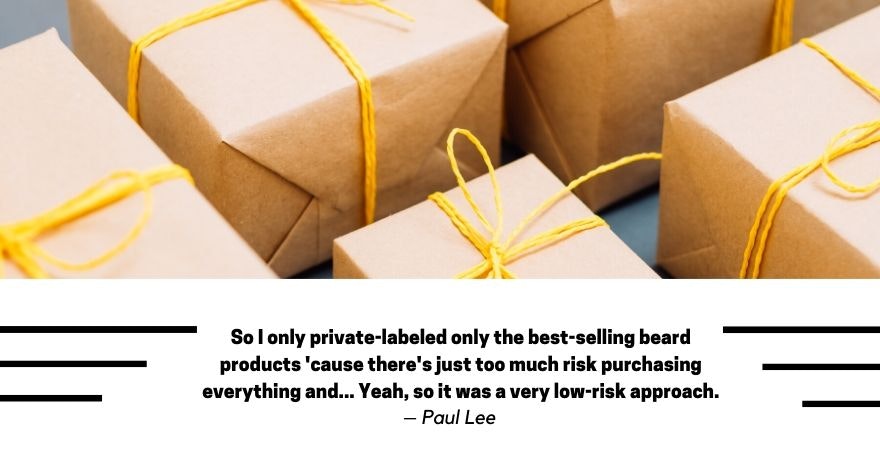
Where to Get An Education
David: So not too long after you started a beard business, you quit college and you quit your job to work on Husky Beard. And what I think is noteworthy is that at this point, it’s not like you were swimming in money, I think you were making about 3,000 a month in revenue, and so just a fraction of that would’ve been the profit. So you weren’t balling out at this point. That might seem a little early to some people to make the leap. What was it that convinced you that this wasn’t crazy, that you’d be able to scale this thing, even if at the moment, you weren’t making six figures in sales?
Paul: So it was just really my disappointment with the college system in America. It was my sophomore year, I had already racked up a good bit of debt in my freshman year and then basically I had signed up for marketing class thinking this would teach me, be helpful for my business. And then the first day, I realized after three hours sitting there, the lady, she’s never even owned a business. So she’s trying to teach me how to start a business and how to market a business and I just thought that was completely ridiculous.
And it’s really just by critically thinking for yourself, “What are my options?” The fact that I’m spending thousands and thousands on this certain course, from this certain teacher who doesn’t know anything about business, I could just use that money and pay people, pay experts or do trial and error and learn it for myself. So I just went with that, and I didn’t really think it was that risky and I could always go back if it didn’t work. I was only 21 at the time, so I could just go back when I’m 23, 25. People act like if you drop out, you can’t go back, you can always go back.
David: And so was there kind of a one-to-one transfer of the funds that would’ve been going to the college or just were kind of shifted over to the business?
Paul: Maybe not one-to-one. But it was definitely savings in terms of how much I would’ve spent on college. So I just approached it very conservatively, like $100 here, $100 there, in terms of my beard business.
Investing In Your Business
David: And so where did the first rounds of investment that you were making in the beard business, where did that go? Was it on marketing to see which products were gonna stick on Facebook or was it… Were you buying development resources to make your website cooler? What were the first things that you ticked off as you started to really invest money into your store?
Paul: It was definitely Facebook ads, 100 percent Facebook ads. I just found that one winning product and then I just kept pouring money into it. At that time, this was like 2017, I didn’t really know what I was doing with Facebook. Looking back, now I know I could’ve made $100,000 in like a couple of months, as opposed to a year.
But yeah, it was just constant learning of the system and I just found so much difficulty and I never quit with Facebook ads. I always made a decision, “I have to master Facebook ads ’cause I know this can be a huge source of revenue for my business, it can be the lifeline.” So yeah, definitely Facebook ads.
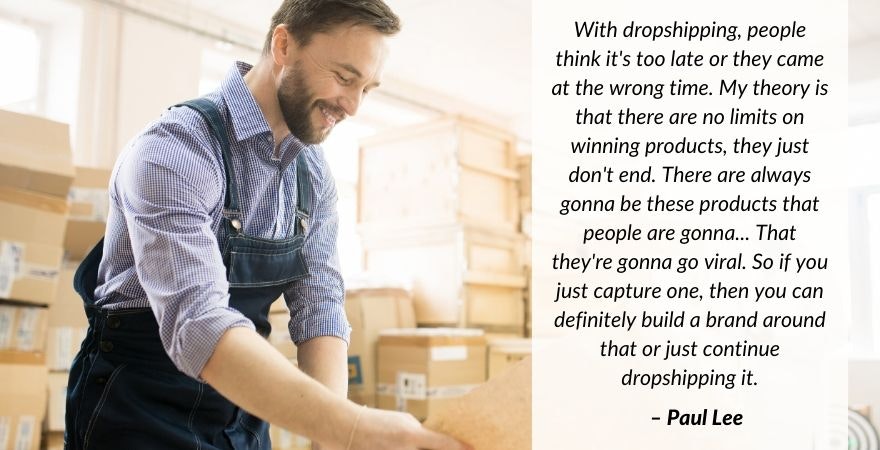
Does it Still Work Today?
David: And could somebody who’s just getting into a dropshipping business or to ecommerce do what you did? Is the process you had repeatable? And I asked this just because it’s only been a couple of years, but a lot’s changed in a couple of years. Did you strike just at the right time? Or is this idea that you can find winning products, brand them and then scale up from there, is that something that you think anybody could do today and tomorrow and moving forward?
Paul: 100 percent. There is no… With dropshipping, people think it’s too late or they came at the wrong time. My theory is that there are no limits on winning products, they just don’t end. There are always gonna be these products that people are gonna… That they’re gonna go viral. So if you just capture one, then you can definitely build a brand around that or just continue dropshipping it. So yeah, there’s definitely no limitations, no shortcut on time.
Selling Your Business
David: So you were running your beard business for a little over a year, you had cracked that coveted six-figure mark, so you were up over $100,000 in revenue, things are going really well and you decided to sell the store. Talk about why you did that and what it was like to kind of pass on this baby that you’d created to the next ecommerce entrepreneur out there.
Paul: So it was never a firm decision, “I’m going to sell this thing.” It’s just, I’d casually listed it on Shopify’s Exchange Marketplace, and then they gave me a valuation of like $80,000 or something like that and I just thought that was like… I can make that and… If I could sell this beard business, that’s one day I can make 80 grand. And then I just listed, “Up for sale,” I got a bunch of offers and stuff. And then slowly and slowly, negotiated my way, found a really passionate guy who wanted to buy my business and then I just kept rationalizing it.
The fact that I don’t have a beard, the fact that there’s not really longevity of this business. ‘Cause I see my competitors, they’re going to trade shows, they’re doing beard sponsorships at these like, at these big community events and stuff, and I just kinda lost my passion for it. This is a product that I’m never going to use, essentially, and it just felt… It was just a lot of stress, revenue was going down and I thought this gave me a lot of good experience. And a guy gave me a good offer so I just, you know, I sold it to him.
Dealing with Business Burnout
David: So you had kinda poured your heart and soul into this from the research side and then, you’re learning Facebook ads, which you said you had no clue what that was about, and you just kinda taught yourself. A lot went into this and then you sold it and then how long was it before you launched another store?
Paul: So it was, I think, about like three months. I think I took a good break, ’cause this was non-stop, like 10-hour days. I just… This was my first time ever being an entrepreneur, really. And yeah, I was just super burnt out. And whenever I’d be burnt out, I wouldn’t quit. I was just burnt out for months and I’d never quit, essentially.
So I really had to take a three-month break, finally gave my parents a vacation and then moved to another city, just kind of spent my money a little bit, instead of always saving it and reinvesting it. I spent a little bit of money and essentially, I actually spent all of my money, like the entire money I made from selling the beard business. But, yeah, and then I started one, a general dropshipping store, three months after.

David: What do you mean you gave your parents a vacation? You bought them a vacation?
Paul: Yeah.
David: Oh okay.
Paul: So we had a whole family vacation.
David: Cool.
Paul: And that was honestly one of my biggest motivations, and I went to some really dark places in the hardest parts of the journey. To motivate myself, I’d be like, “This is not just for you, this is for your family, this is for your future, this is for… This is not just for you, this is not just about making money.” The fact is my parents are in their 60s. Any day. They work every day for 14 hours, non-stop, no vacation. I just thought, “I’m the only person that could potentially give ’em something a little bit better,” so that was a really strong motivation.
David: Cool. Yeah, we’ve heard that from other dropshippers that it’s really helpful to have something tangible that you’re working for. And so I know some people, when they hit a certain revenue mark, then they’ll allow themselves to buy a watch or they’ll… That’s when they get to take a vacation, have a digital nomad lifestyle or whatever. So I think having these benchmarks that you’re gunning for, whether it’s a watch or a vacation for your parents, that… We’ve heard that that’s a really galvanizing force for a lot of entrepreneurs.
Paul: Definitely.
David: You mentioned 10-hour days and that you were kind of in dark places. Talk a little bit about that ’cause I know that this is a very real part of doing your first business and it’s not easy. I think that there’s… The bar to starting a beard business has been lowered, thanks to Shopify and to Oberlo, there are a lot of tools that you have where you can start something now that you couldn’t before, but that does not mean that it’s easy or simple. And so what do you mean when you say you were in a dark place sometimes when you were running the store?
Paul: It’s just the non-stop stress. I think there’s a difference… A huge difference, too, between having your own branded store, versus a dropshipping store. You have to actually deal with the quality inspection, you have to deal with the suppliers, you have to really be hands-on with the customer service, ’cause these are your audiences. They’re not just one-time customers, and dealing with customer complaints, defective products, handling refunds and just sometimes sales would dip. So it was just, it was just a lot on the line.
For me, it’s like, “If I don’t make this thing work, then I’m essentially just never gonna get a job, I’m never gonna get employed.” I just kinda went to some… I just kinda convinced myself that, “I have to make this work and if I didn’t, then I’d always be living in my parents’ house in this boring city, never get to see my friends in this other city,” which is Atlanta, which I moved to. And yeah, I just really convinced myself psychologically, “This has to work, there’s no choice.”
David: And so the… You said you took a three-month pause after you sold the store. Were you able to decompress? Are you still running these stories in your head?
Paul: Yeah. The first success story is just like, I was just not doing it as well as I could, so I just made it a lot harder on myself. Nowadays, it’s just, I can make those kinda numbers very much quickly. And also I have a lot more people working for me, so I get to enjoy that little bit of leverage and just really focus on the one to three things I’m very good at and essentially outsource everything else.
Working With Freelancers
David: And, outsourcing and setting up systems with freelancers or with virtual assistants, this is something that we hear about a lot. What is your… When you say that you focus on one to three things, awesome. And then what is happening with items four through 100 that you also need to take care of when you run the beard business?
Paul: So I think the biggest thing is to not be a control freak and just let people, who already have experience, probably more experience than you, just let them manage it. And then as long as it’s not bad, then it’s… It’s fine, honestly. And then there are little things you can do, you can… At first, you’re gonna wanna micro-manage them. And you can do that for a bit, but don’t go crazy with it.
And then, don’t be hesitant to fire, as well. I’ve fired a lot of VAs, and that’s just the nature of it. I really want high-conscientious, highly effective, highly skilled workers working for me. And I know that if they give me value, then I’m gonna tremendously give ’em value back in terms of how much I’ll pay them, and the opportunity of a big store. They’re gonna get a good bit of money as well.
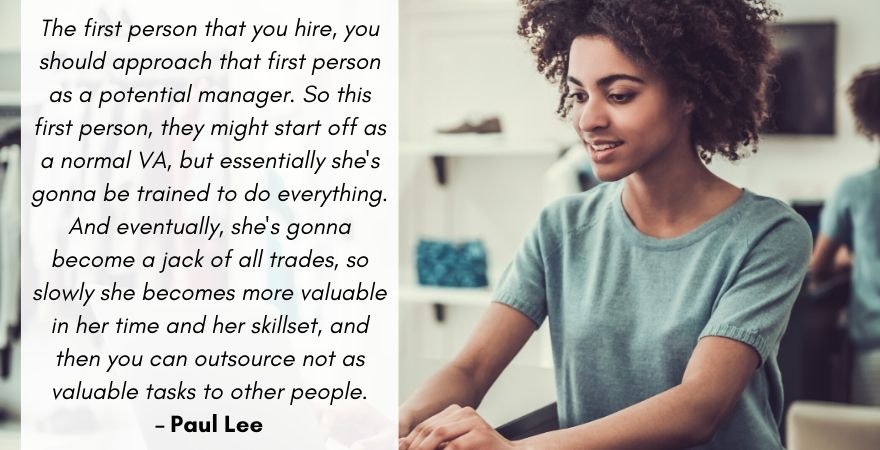
Another tip for starting a beard business is that the first person that you hire, you should approach that first person as a potential manager. So this first person, they might start off as a normal VA, but essentially she’s gonna be trained to do everything. And eventually, she’s gonna become a jack of all trades, so slowly she becomes more valuable in her time and her skillset, and then you can outsource not as valuable tasks to other people.
That way the first person you hired, she manages everybody else, she trains everybody else. So that first person, you gotta really look out for, “Is this the best person that could potentially be a manager?”
David: And so what sort of relationship do you have with virtual assistants? Where are they, how often do you talk to them, what does that look like? ‘Cause they’re, in a weird way, they’re your colleagues, or they’re working under you. But it’s not like the conventional colleague setup, where you see ’em at the coffee machine every morning. So what does this relationship look like?
Paul: So the relationships are definitely all virtual. And so basically about maybe 10 minutes, 10 to 15, maybe 20 minutes a day, we talk virtually, either through Skype or Slack. But there really is not that much work involved, because the way I structured it, is that they all know what they’re gonna do, they all have their daily tasks.
And then if for some reason they’re not doing their daily tasks, is when I get involved. I’m like, “Hey, are you okay? Did something happen? I noticed this wasn’t done,” or, “This wasn’t done the way I wanted it to, the way I told you to do it.” And a lot of times, I’d give ’em guides or policies or videos, how to do the… How to do whatever. So yeah, it was actually pretty hands-off, just making sure they’re doing their tasks. And a lot of times, my manager would just honestly do that, so not much for me.
David: And what are the daily tasks? So would this be like fulfilling orders part of things, the replying to emails; that sort of stuff?
Paul: Yeah. So I basically categorized every single component of dropshipping from the customer service side, fulfillment side, Facebook advertising side. I literally outsource like to seven different things. So to give you some examples, customer service; they handle all emails, all Facebook comments, deleting them, hiding them or whatever, customer order fulfilments, Facebook ads, testing.
That didn’t really work out too well, ’cause I have to control it, essentially. And a video editor, and product researchers; I hired two of them, and I basically told them, “These are the kinda products I’m looking for. This is how you find them. You go on these sites, you do this specific method, then you swap with another method, and then you give me 20 products every single day in an Excel sheet.” And basically I say, “Okay, 10 of these products, I don’t like 10 of these products, let’s go, let’s go and test them.” It’s completely outsourced.
What To Work On After Selling Your Business
David: So that’s what they’re doing, and then what are you doing at this point in this business? ‘Cause you said you hung on to the things that you’re really good at, so what exactly is that? What’s at the core of the business that you’re doing now?
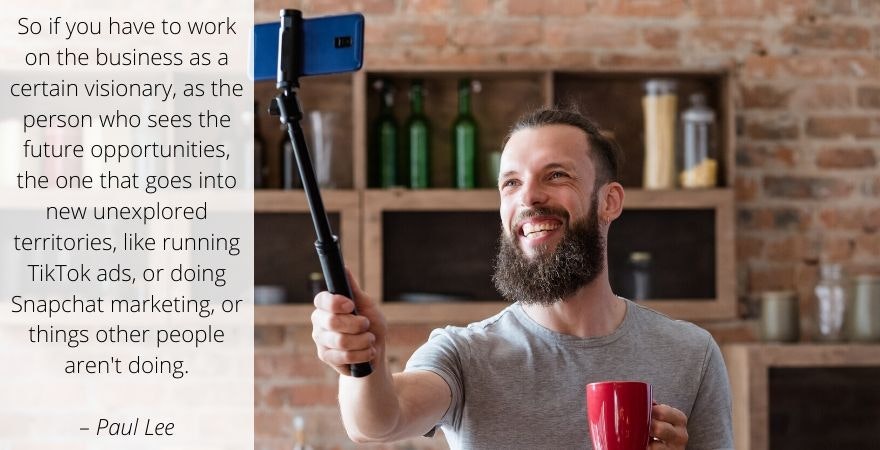
Paul: So I believe there’s a certain point, where you have to stop working in the business and work on the business. So if you have to work on the business as a certain visionary, as the person who sees the future opportunities, the one that goes into new unexplored territories, like running TikTok ads, or doing Snapchat marketing, or things other people aren’t doing. So that’s really what I spend my time doing. I also spend my time mostly on Facebook ads as well, scaling ’em, killing them, and then a little bit of product research and product selection as well.
Branded VS. General Store
David: So you’ve had two pretty distinct methods to build a pair of dropshipping stores. So there was the very brand-intensive approach that you did the first time around, and then now it sounds like you’re doing, I don’t know, what would be called more normal dropshipping or where there’s a wide array of products and you’re using Facebook ads to test ’em out, as opposed to being fully committed to a single very particular niche. What can you say about these two different styles now that you’ve done them both? What’s good, what’s bad about the different approaches that you’ve taken to launching these businesses?
Paul: So with the first branded store, the… Basically it’s the limitation of the number of products that you can test. And then the benefit of the general dropshipping store, is you can test anything and everything, but they’re both different though. With a general store, it’s a very numbers game. It’s just like if you test 10 products, nine of them are not gonna work, and then one of them might work essentially.
But with a very niche store, it’s like, you have maybe 50 potential products in that entire niche, let’s say, and then you grab maybe 10 of them, you kinda have to make it work. So you put a little bit more emphasis on the marketing, on the creatives, on the branding, on the marketing of it. But with a general dropshipping store, it’s kinda like you’re just throwing products on the wall. And doing a decent job at marketing, not going crazy all-in on the marketing because we have no guarantee that these products are even gonna stick, so I guess that’s the biggest different approach.
With niche and with branded stores, it’s a lot more catered.It’s a lot more catered, you put a lot more emphasis on the marketing. General store, it’s like you put more emphasis on products, on any product.
David: Alright, we can leave it there. Paul, thank you so much for taking the time to chat.
Paul: Yeah, thank you dude, it was good.


